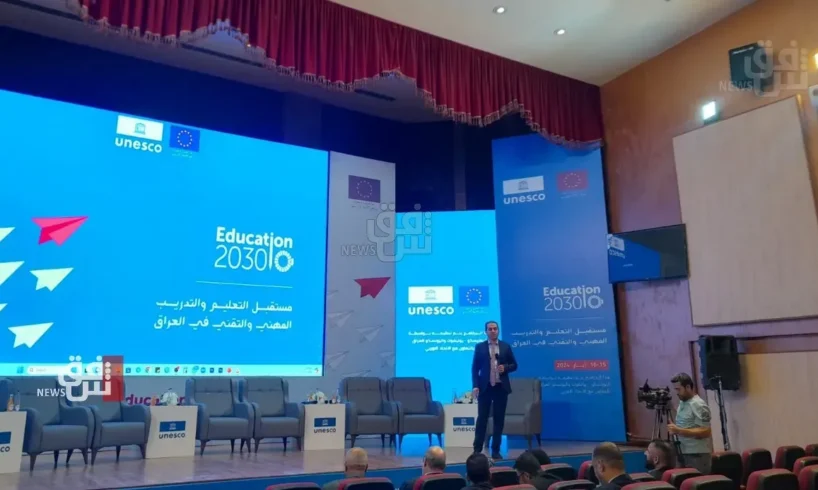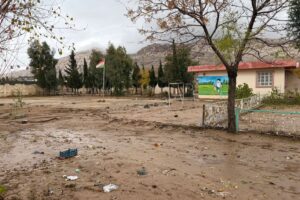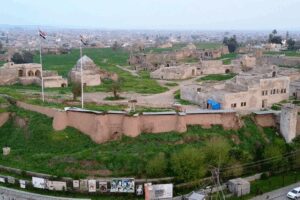
Shafaq News – Baghdad
In Iraq, where uncertainty and economic pressures shape
everyday life, students are quietly redefining education. Workshops are
replacing traditional lecture halls, offering not just practical skills but
independence, purpose, and new possibilities.
Once seen as a fallback, vocational education is now opening
real opportunities, challenging long-held notions of success and ambition
across the country.
Quantitative Shift
Out of more than 7.6 million students in pre-university
education, around 280,000 are enrolled in vocational education across 320
vocational schools spread throughout the country, according to the Ministry of
Education.
By comparison, Iraqi universities enroll over 1.3 million
students in 35 public universities and 45 private universities and colleges,
though enrollment has steadily declined over the past five years, while
vocational school enrollment has surged by 37% over the same period.
The shift reflects a pragmatic choice in Iraq, where overall
unemployment exceeds 15% and youth unemployment reaches 28%. Vocational
education has emerged as a tangible pathway that directly connects schooling
with the job market.
University degrees can take years to complete and cost
millions of dinars in private institutions, while vocational education costs no
more than 300,000 dinars (about $204) annually for most programs and offers
hands-on training in workshops and factories.
Yet this rising demand encounters a harsh reality: outdated
school buildings, limited practical workshops, weak infrastructure, and the
absence of a comprehensive development plan for this vital sector under the
Ministry of Education.
Baghdad alone hosts 70 vocational schools, compared with 35
in Basra and 30 in Nineveh, while provinces like Diyala and Muthanna face a
shortage of vocational institutions and inadequate facilities.
In this context, Deputy Chair of the Parliamentary Education
Committee, Nadia Mohammed Al-Aboudi, highlighted the need for a series of
structural reforms in Iraq’s vocational education, some of which have already
begun in Basra. The province has recorded notable improvements in several
vocational schools after previous administrations, weak in oversight and
performance, were replaced.
“Comprehensive vocational schools for both males and females
should be built across all regions, with adequate classrooms and modern
laboratories to support technical specialties,” she added, stressing the
importance of updating vocational programs to better meet labor market demands.
Limited Capacity
Vocational education in Iraq is experiencing rising
enrollment, with some schools now operating both morning and evening shifts to
meet growing demand, according to Mohammed Qutaiba Al-Bayati, a member of the
Parliamentary Higher Education Committee.
Technical institutes now provide more than 70
specializations across industrial, agricultural, commercial, and hospitality
fields—from electronics and medical device maintenance to automotive technology
and hotel management.
The surge in interest is driven by clear employment
advantages. Graduates increasingly secure university placements, particularly
in private colleges, in fields such as engineering, cybersecurity, oil
refining, and automotive technology.
Families’ perceptions are evolving alongside these trends.
In Baghdad, Basra, and Dhi Qar, parents are increasingly motivating children to
pursue vocational education, viewing it as a faster and more direct path to
employment. Students themselves recognize the benefits: workshops and practical
training are now deliberate choices for shaping professional futures.
The demand extends beyond middle school graduates. Even
those who do not complete preparatory education are joining vocational programs
that provide direct access to the labor market. Ministry of Labor data reveals
that over 45% of new private-sector jobs created between 2022 and 2025 were
filled by vocational certificate holders or technical institute graduates,
highlighting the sector’s expanding role in employment.
The World Assists
Amid ongoing challenges, Iraq is seeing a rise in efforts to
strengthen vocational and technical education. On August 10, 2025, UNESCO and
the European Union launched the Green and Digital Technical and Vocational
Education and Training Project to boost employment, partnering with the Iraqi
government to align vocational curricula with the country’s technological and
digital transformation needs.
This builds on earlier initiatives. In May 2024, UNESCO,
together with the EU and the Iraqi government, introduced the TVET 2 Reform
Project to expand tangible job opportunities by linking technical and
vocational education more closely with the labor market.
UNESCO-UNEVOC noted that this collaboration forms part of a
long-term national strategy (2022–2031) to reform vocational education, enhance
skills, and deliver real employment prospects for Iraqi youth.
At the national level, the Ministry of Education launched
the Integrated Vocational Pathway initiative in 2024 alongside the Ministries
of Labor and Industry, emphasizing curriculum development and practical factory
training.
Complementing this, the Ministry of Higher Education
implemented a program to train vocational school teachers through joint courses
with technical universities, reaching over 800 instructors across provinces to
modernize teaching approaches and strengthen practical skills instruction.
Private and regional support is also shaping the landscape.
In Basra, oil companies supplied vocational schools with modern laboratories
and equipment in cooperation with the local government. At the same time,
Baghdad and Nineveh inaugurated five vocational training centers funded by the
German Development Agency (GIZ) and the EU under the Education for Employment
Project, serving up to 10,000 students annually.
Iraqi society now increasingly recognizes that practical
skills create real opportunities for youth, and that technical and applied
specializations are now considered essential pathways from education to
employment, offering autonomy and tangible prospects in a rapidly evolving
labor market.
Written and edited by Shafaq News staff.





